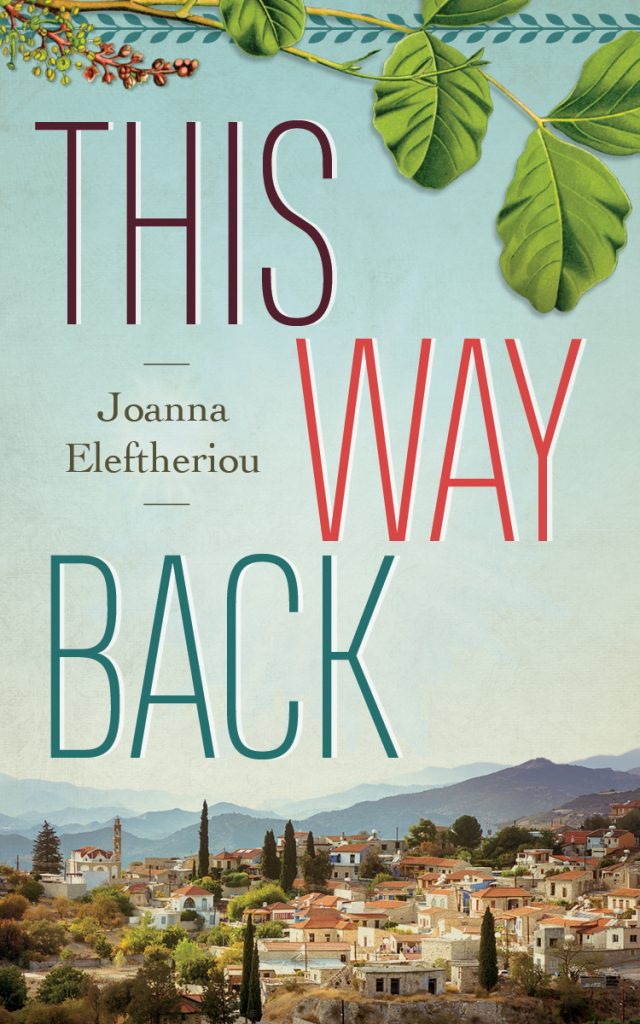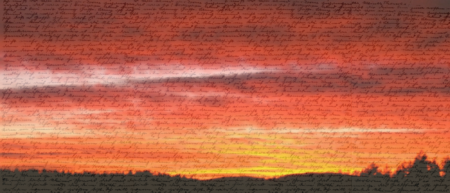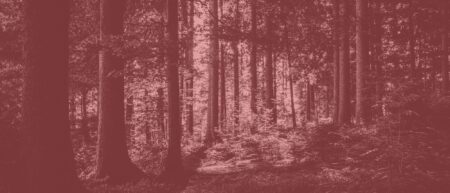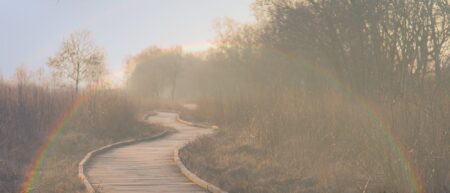It’s tempting to see essayist and scholar Joanna Eleftheriou as a hybrid, an unusual blend of two distinct cultures. She’s Greek and she’s American. She is fluent in two languages and translates her own and others’ works back and forth. She writes essays saturated in memoiristic detail that mine a Greek heritage that is both ancient and modern. Yet, our instinct to neatly categorize everything often gets more wrong than right, she thinks. The world and our selves are not boxes with clear labels. Eleftheriou finds herself drawn to the spaces that lie in between categories. She thinks a lot about nonfiction genre, where it has been, and where it is going. And then there is her own reflection on her own complicated and evolving identity.
Her first book, This Way Back (West Virginia Press, 2020), is a series of personal essays woven with memoiristic reflection on growing up in a family that moved from New York to Cyprus to New York and back again. These peregrinations were driven by her late father’s desire to return home and abide with his family in the land of his birth and youth. Elerftheriou’s essays touch on Greek-American identity, the trauma of the Turkish invasion of Cyprus and Eleftheriou’s own coming out despite the homophobia of her family and Greek-Cypriot culture.
Bruce I. Friedland explores her work, nonfiction, and the effort to find meaning and transcend trauma in an interview with Eleftheriou that took place over email in late May.

Bruce Friedland: I love the title of your book, This Way Back, and the story you tell of the sign in a Cypriot town with these words on it. The sign strikes you as ambiguous. It resonates with existential weight. How should we understand this title as it relates to your collection of essays?
Joanna Eleftheriou: Thank you! The title works on three levels. First, it suggests the way back to an original homeland, something most refugees and immigrants desire. In the book, different characters display differing levels of desire to get back to their place of origin, and of course I am pulled “back” both to my American birthplace and to my Greek and Cypriot ancestral lands. I’ve spoken to many second, third, and even fourth generation Americans, and many have said that they, too, have felt a strange longing for a “way back” to a place whence their parents, grandparents, or great-grandparents have come. This common longing may tell us something about what it means to be American or what it means to be human. In an age where “migrants” are stigmatized and feared, I think it’s especially fruitful to draw attention to the near-universality of a belief that one’s origins lie far removed from the land where one currently lives.
The second level is the way I misread the sign. Rather than realizing that it was a simple road sign that indicated that the side street to which it pointed was the best way back to the city center, I imagined that it was a political message, and that the unspoken context for it was the 1974 invasion. By making that misreading central, I both illustrate the way the invasion dominates Greek-Cypriot life and, at the same time, I make the experience of life in a second language central to the book. Most Americans spend their whole lives speaking just their first language, and I wanted to give them a sense of what it’s like for people who move back and forth between languages.
On a third level, the title does indeed refer to a “way back” in a spiritual sense. Returning to a true self is one way of imagining it — we come into the world as our selves, and the pressures, conventions, and demands of the social world change us, and we spend time returning to that true self. Also, many religions have something like the garden of Eden, where humans lived in total connection with one another and the deity. These diverse religions all seem to be getting at a universal human impulse to get back to a self before distraction and before the ruptures that are generated by the ego.
BF: Your work is infused with bi-cultural insights from living in New York and Cyprus, in a Greek and an American reality. How do you think about your relationship to these two societies?
JE: My mind always considers how a thought or sentence in one language would be configured in the other. As a result, I quite naturally identify assumptions embedded within language and culture, and my narration tends to defamiliarize things for my American readers. I use the insight of how Greeks construe the same event in order to drive a wedge between the events and the way my American brain (like the brain of my American readers) would habitually perceive them.
All in all, my bi-cultural experience allows my work to become for American readers a means of reflecting on things they may take for granted.
BF: This instinct jumps off the page in your essay “Ithacas,” where you dissect the etymology of “nostalgia,” as the pain (or “algos” in the Greek) that comes from longing for home. Then you probe further, bringing your readers to a deeper level: “After we find ourselves home, we expect a sudden bliss. But real places disappoint. Upon arrival, we feel not bliss but algos once again, and this a different ache, an ache that isn’t sung.” This is such a precise and piercing insight.
JE: Indeed, I feel like I can get to the bottom of emotional puzzles by pressing against language. The words themselves carry within them the knowledge and wisdom of many generations.
BF: Your themes, such as belonging, loss, and desire, resonate through your work and reflect your life experiences and identity. To what extent do these ideas speak to how you think readers and nonfiction writers should think about their own identities?
JE: I knew that I was concerned with belonging and loss, but for many of the themes that recur in the book, I didn’t realize I had these obsessions until I looked at my essays and saw the patterns! Especially labor, and how it intersects with the problem of gender. That was a thrilling revelation. Identifying thematic patterns in my essays empowered me to locate and examine unspoken beliefs I seem to hold. Examining my recurring observations about the nature of work suggests to me that I have some beliefs about the connection between gender, physical exertion, and achievement. I also learned a lot about myself by reflecting, after the manuscript was fully drafted, on the connection between the major themes of belonging, loss, and desire, with those minor ones such as labor and (another one I didn’t realize was there until I looked at the whole book) the role of screens in our lives. Realizing that I write obsessively about sacrifice and its contradictions helped me better understand the compulsions that govern my day to day life.
I think this suggests that readers and writers might unlock some hidden knowledge about their identities by writing freely, without thinking too hard while composing a first draft, and then examining later what they have produced. One never wants to go into a draft with preconceived notions about what will come out. And that’s how we can think most productively about identity — no preconceived notions. What’s most important is to get into the habit of remembering, always, that every aspect of identity is culturally constructed — and those cultural constructs govern our lives.
BF: Your essays include extensive memoirist reflection on your personal history. Why did you opt for the essay form rather than a memoir? How do you think this choice affects the narrative persona in the work?
JE: Before making the decision to write an essay collection, I conducted research on the differences between essay and memoir. Memoir’s primary investment is answering the question “how did the events I lived through and the choices I made shape the person I’ve become?”
While the essay frequently dramatizes life events just as memoir does, those events are dramatized, in the essay, for a subtly distinct purpose. G. Douglas Atkins writes, in Tracing the Essay, that the essay “represents the self not for its own sake but rather as a crucible in which experience is tried and tested.” The essay’s primary investment, then, is a “testing of experience” in order to illuminate a given theme or idea, and arrive at meaning. Atkins argues that the essay “focuses on achieved meaning to a greater extent than those other forms we typically call literature.” My essays examine themes of belonging, sacrifice, loss, memory, kinship, desire, and work among others, and I primarily wanted to explore those themes. How I came to be the person I am is a secondary, ancillary question. That memoir question does get answered, but my priorities as an author align most closely with the priorities of the essay.
As a test, just to make sure, I did produce a memoir manuscript in 2018. That book is radically different from the one I published. It proceeds in a linear, chronological way, and it differs in voice, too. The persona that narrates the memoir necessarily possesses the knowledge of my whole life, and takes a kind of longer view, thinking about causality with the privilege of that wider lens. I prefer the persona of the essay, which possesses less knowledge about me, and more knowledge about the world. Producing that manuscript only cemented my hunch that I want to publish the essay collection, not the memoir.
BF: Your essays reflect on your upbringing and parents. Your late father and his own complicated relationship to Cyprus and its impact on your family is sharply etched. Personal essayists and memoirists frequently dredge their own lives and write about their families. This poses real risks to relationships. How do you think about this?
JE: I only tell stories I believe are mine to tell. I believe that by choosing to raise me, my parents gave me the right to dramatize most of their lives, since everything they experienced became part of my story. I don’t name romantic partners or dramatize experiences with them, mostly because those don’t tend to expand out toward the themes I mentioned above.
I certainly feared my mother’s reaction upon reading my book. However, I had told the truth. If we tell the truth, there should be no risk to a real relationship. One temptation for authors is to take advantage of their position as storyteller to show themselves in the best possible light, and place blame on others. The temptation to frame ourselves as better than we are, and blame others for our wounds, is dangerous.
I certainly took great care to push myself beyond my own wounds — I write:
“Rather than begging my mother to abandon for my sake the way she’d always seen the world, so that she could utter to me the words of acceptance I so craved, maybe I could decide, myself, to see the world differently, in a less wounded way, in the light of something other than my trauma.”
If one makes that effort in earnest, I don’t think that truth-telling can make a relationship worse. And mine didn’t. My honest portrayal of my mother’s homophobia prompted a personal reckoning. And after reading the book, for the first time in my life my mother actually listened to me.
BF: The notion that you could decide to adjust your understanding, “to see the world differently, in a less wounded way,” is a powerful thought, a transfiguration. Can you elaborate on what this reframing involved?
JE: After I’ve done that, and after I’ve received some more kindness from a person — a Turk – who should have been my enemy, I find myself fortified and empowered to offer some grace to my mother. I hope it’s clear that this grace was only possible in community — after my Turkish host shared with me our experience of the same wound.
BF: To what extent does the sentiment that one needs to transcend or reframe emotional injury leave you open to a criticism that doing so may downplay the victim’s trauma?
JE: I agree that someone might construe this moment as invalidating my experience. However, I spent a lot of the book asserting the irrevocable damage that homophobia inflicted on me. In addition, I open the book with a funeral in order to fix in the reader’s mind what healing rituals my culture does offer — when what needs healing is the kind of loss, or the kind of pain, pain the culture is willing to see. I think I made very clear that the culture and much of my family behaved with utter cruelty by depriving me of that kind of community and compassion. After making my suffering clear, I think that it was right to proceed, with humility and courage, to ask how my own oppressors may have suffered. That’s how I arrive at one of the book’s most enlightened insights: that violence is a cycle, and that what drives the cycle is the drive to be safe. When we seek safety in clumsy, unenlightened ways, we injure others. This is happening every day on the public world stage and in the private, domestic space.
JOANNA ELEFTHEROIU is an assistant professor of English at Christopher Newport University, a contributing editor of Assay: A Journal of Nonfiction Studies, and a faculty member at the Writing Workshops in Greece. Her essays, short stories, and translations appear regularly in journals including Apalachee Review, Chautauqua, CutBank, Arts and Letters, and The Common. Her first book, This Way Back, was published in 2020.
BRUCE I. FRIEDLAND is a former journalist with a deep interest in history, religion and the unexpected ways that personal histories shape our identities. He holds an MFA in creative nonfiction from Goucher College and lives with his wife in the suburbs of Washington DC and, when he gets the chance, beneath the big open sky of New Mexico.



